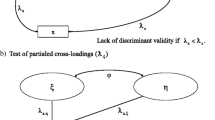Abstract
The received view of an ad hochypothesis is that it accounts for only the observation(s) it was designed to account for, and so non-ad hocness is generally held to be necessary or important for an introduced hypothesis or modification to a theory. Attempts by Popper and several others to convincingly explicate this view, however, prove to be unsuccessful or of doubtful value, and familiar and firmer criteria for evaluating the hypotheses or modified theories so classified are characteristically available. These points are obscured largely because the received view fails to adequately separate psychology from methodology or to recognise ambiguities in the use of 'ad hoc_'.
Similar content being viewed by others
REFERENCES
Asimov, I.: 1975, Eyes on the Universe: A History of the Telescope, Houghton Mifflin, Boston.
Bamford, G.S.: 1989, Popper, Refutation, and 'Avoidance' of Refutation, Ph.D. thesis, The University of Queensland, Brisbane.
Bamford, G.S.: 1993, 'Popper's Explications of Ad Hocness: Circularity, Empirical Content, and Scientific Practice', The British Journal for the Philosophy of Science 44, 335–55.
Bamford, G.S.: 1996, 'Popper and his Commentators on the Discovery of Neptune: A Close Shave for the Law of Gravitation?', Studies in History and Philosophy of Science 27(2), 207–32.
Chalmers, A.F.: 1982, What is This Thing Called Science: An Assessment of the Nature and Status of Science and its Methods? (second edition), University of Queensland Press, St. Lucia, Queensland.
Drake, S.: 1957, Introduction to Discoveries and Opinions of Galileo, by Galileo, trans. S. Drake, Anchor Books, New York.
Drake, S.: 1978, Galileo at Work: His Scientific Biography, University of Chicago Press, Chicago.
Fetzer, J.H. and Almeder, R.F.: 1993, s.v. 'Ad hoc/ad hocness/ad hoc hypotheses', Glossary of Epistemology/Philosophy of Science, Paragon House, New York.
Galileo, G.: 1929–39, Le Opere di Galileo Galilei, 20 vols. in 21, vol. 11, Barbera, Firenze.
Gillies, D.: 1990, 'Bayesianism Versus Falsificationism', Ratio (New Series) III, 82–98.
Grant, R.: 1966, History of Physical Astronomy, The Sources of Science, no. 38, Johnson Reprint Corporation, New York.
Grosser, M.: 1962, The Discovery of Neptune, Harvard University Press, Cambridge, Mass.
Grünbaum, A.: 1976, 'Ad Hoc Auxiliary Hypotheses and Falsificationism', The British Journal for the Philosophy of Science 27, 329–62.
Hempel, C.G.: 1966, Philosophy of Natural Science, Foundations of Philosophy Series, Prentice Hall, Englewood Cliffs, N.J.
Holton, G.: 1969, 'Einstein, Michelson, and the Crucial Experiment', Isis 60 (Summer), 133–97.
Howson, C. and Urbach, P.: 1989, Scientific Reasoning: The Bayesian Approach, Open Court, La Salle, Illinois.
Klüber, H. von.: 1960, 'The Determination of Einstein's Light Deflection in the Gravitational Field of the Sun', in A. Beer (ed.), Vistas in Astronomy 3, Pergamon Press, London, 47–77.
Lakatos, I.: 1970, 'Falsification and the Methodology of Scientific Research Programmes'. In I. Lakatos and A. Musgrave (eds.), Criticism and the Growth of Knowledge, Cambridge University Press, Cambridge, 91–195.
Laudan, L.: 1977, Progress and its Problems: Towards a Theory of Scientific Growth, University of California Press, Berkeley.
Leplin, J.: 1982, 'The Assessment of Auxiliary Hypotheses', The British Journal for the Philosophy of Science 33, 235–49.
Mason, S.F.: 1956, Main Currents of Scientific Thought: A History of the Sciences, Routledge and Kegan Paul, London.
Maxwell, G.C.: 1974, 'Corroboration without Demarcation', in Schilpp (ed.), 292–321.
Miller, D.W.: 1981, s.v. 'Ad-Hoc Hypotheses', in W. Bynum, E. Browne and R. Porter (eds.), Dictionary of the History of Science, Princeton University Press, Princeton.
Musgrave, A.E.: 1973, 'Falsification and its Critics', in P. Suppes, L. Henkin, A. Joga, and Gr. Moisil (eds.), Logic, Methodology and Philosophy of Science IV: Proceedings of the Fourth International Congress for Logic, Methodology, and Philosophy of Science, Bucharest, 1971, North Holland Publishing Co., Amsterdam, 393–406.
Musgrave, A.E.: 1974, 'Logical versus Historical Theories of Confirmation', The British Journal for the Philosophy of Science 25, 1–23.
Musgrave, A.E.: 1976, 'Method or Madness? Can the Methodology of Scientific Research Programmes be Rescued from Epistemological Anarchism?', in R. Cohen, P. Feyerabend, and M. Wartofsky (eds.), Essays in Memory of Imre Lakatos, Boston Studies in the Philosophy of Science, vol. 39, D. Reidel, Dordrecht, 457–91.
Musgrave, A.E.: 1978, 'Evidential Support, Falsification, Heuristics, and Anarchism'. In G. Radnitzky and G. Andersson (eds.), Progress and Rationality in Science, Boston Studies in the Philosophy of Science, vol. 58, D. Reidel, Dordrecht, 181–201.
Newcomb, S.: 1929, 'Discordances in the Secular Variations of the Inner Planets', in H. Shapely and H. Howarth (eds.), A Source Book in Astronomy, Source Books in the History of Science, McGraw Hill, New York, 330–38.
Newcomb, S.: 1911, 'Neptune', Encyclopedia Britannica (eleventh edition), vol. XIX, Cambridge University Press, Cambridge, 385–87.
Popper, K.R.: 1972, Conjectures and Refutations: The Growth of Scientific Knowledge (fourth revised edition), Routledge and Kegan Paul, London.
Popper, K.R.: 1974, 'Replies to My Critics', in Schilpp (ed.), 961–1197.
Popper, K.R.: 1975, The Logic of Scientific Discovery (eighth impression), Hutchinson and Co., London.
Popper, K.R.: 1976, Unended Quest: An Intellectual Autobiography, Fontana/Collins, London.
Quine, W.V. and Ullian, J.S.: 1980, 'Hypothesis', in E. Klemke, R. Hollinger and A. Kline (eds.), Introductory Readings in the Philosophy of Science, Prometheus Books, New York, 196–206.
Radnitzky, G.: 1981, 'Progress and Rationality in Research', in M. Grmek, R. Cohen and G. Cimino (eds.), On Scientific Discovery: The Erice Lectures 1977, D. Reidel, Dordrecht, 43–102.
Salmon, W.C.: 1990, 'Rationality and Objectivity in Science, or Tom Kuhn Meets Tom Bayes', in C. Savage (ed.), Scientific Theories, Minnesota Studies in the Philosophy of Science, vol. 14, University of Minneapolis Press, Minneapolis, 175–204.
Schilpp, P.A. (ed.), 1974, The Philosophy of Karl Popper, The Library of Living Philosophers, vol. 14, Open Court, La Salle, Illinois.
Schlesinger, G.: 1987, 'Accommodation and Prediction', Australasian Journal of Philosophy 65, 33–42.
Sprott, W.F.: 1936, 'Review of A Dynamical Theory of Personality', by K. Lewin, Mind 45, 246–51.
Sutton, C.: 1992, Spaceship Neutrino, Cambridge University Press, Cambridge.
The Shorter Oxford English Dictionary: 1973, s.v. 'ad hoc', (third revised edition).
Author information
Authors and Affiliations
Rights and permissions
About this article
Cite this article
Bamford, G. What is the Problem of Ad Hoc Hypotheses?. Science & Education 8, 375–386 (1999). https://doi.org/10.1023/A:1008633808051
Issue Date:
DOI: https://doi.org/10.1023/A:1008633808051




